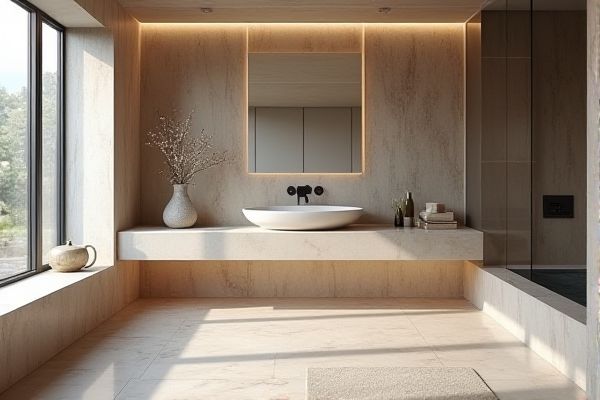
Soapstone offers natural heat resistance and a soft, smooth surface that develops a unique patina over time, while engineered stone provides greater durability, uniform appearance, and is highly resistant to stains and scratches. Discover which material best suits Your style and functionality needs in the rest of this article.
Table of Comparison
| Feature | Soapstone | Engineered Stone |
|---|---|---|
| Composition | Natural talc-rich stone | Crushed quartz mixed with resin |
| Durability | Soft but heat resistant | Highly scratch and stain resistant |
| Maintenance | Requires regular oiling and sealing | Low maintenance, stain resistant |
| Appearance | Matte, smooth, natural veining | Uniform appearance, variety of colors |
| Heat Resistance | Excellent heat resistance | Good heat resistance but can be damaged by high heat |
| Cost | Moderate to high | Moderate, often cost-effective |
| Environmental Impact | Natural, minimal processing | Manufactured, resin-based materials |
| Common Uses | Countertops, sinks, fireplaces | Countertops, flooring, backsplashes |
Introduction to Soap Stone and Engineered Stone
Soapstone, a natural metamorphic rock composed primarily of talc, is prized for its heat resistance, durability, and smooth, matte finish, making it a popular choice for countertops and sinks. Engineered stone, crafted from crushed natural stone mixed with resin and pigments, offers a wide range of colors and patterns while providing increased hardness and non-porous surfaces for easier maintenance. Your decision between soapstone and engineered stone depends on preferences for natural texture versus design variety and resistance to staining or scratching.
Composition and Material Differences
Soapstone is a natural metamorphic rock primarily composed of talc, which gives it a soft, smooth texture and excellent heat resistance. Engineered stone consists of crushed natural quartz mixed with resin and pigments, resulting in a highly durable and uniform surface that resists stains and scratches. Understanding these composition and material differences can help you choose the best countertop option based on durability, maintenance, and aesthetics.
Appearance and Color Options
Soapstone offers a natural, matte appearance with soft, muted color tones typically ranging from light gray to deep charcoal, often featuring subtle veining that provides a timeless, organic look. Engineered stone boasts a wide variety of vibrant color options and patterns, including uniform hues and bold designs, thanks to its composite makeup of quartz, resins, and pigments. Your choice depends on whether you prefer soapstone's classic, earthy aesthetics or the versatile, customizable appearance of engineered stone surfaces.
Durability and Strength Comparison
Soapstone offers excellent durability with natural resistance to heat and stains, making it ideal for kitchen countertops, but it is softer and more prone to scratches compared to engineered stone. Engineered stone, composed of quartz and resin, boasts superior hardness and strength, providing higher resistance to impacts and abrasions. Your choice should consider the balance between the natural, heat-resistant qualities of soapstone and the robust, low-maintenance properties of engineered stone.
Maintenance and Care Requirements
Soapstone requires minimal maintenance, as its natural resistance to stains and heat allows for easy cleaning with mild soap and water; occasional application of mineral oil enhances its rich patina and prevents drying. Engineered stone demands regular cleaning with non-abrasive, pH-balanced cleaners to protect its resin binder from damage and prevent dulling. Both materials benefit from prompt spill cleanup, but engineered stone is more sensitive to harsh chemicals and heat, necessitating careful care to maintain its appearance over time.
Heat and Stain Resistance
Soapstone offers exceptional heat resistance, tolerating high temperatures without damage, making it ideal for kitchen countertops exposed to hot pots and pans. Engineered stone, composed primarily of quartz and resins, provides superior stain resistance due to its non-porous surface, ensuring easier maintenance and less susceptibility to liquids. Your choice between soapstone and engineered stone should consider heat exposure needs and stain resistance preferences to optimize countertop durability.
Installation Process and Flexibility
Soapstone offers easier installation due to its softness and ability to be cut and shaped with standard woodworking tools, making it ideal for custom designs and DIY projects. Engineered stone requires specialized equipment and professional installation because of its hardness and weight, limiting flexibility but ensuring consistent durability and finish. Your choice depends on whether you prioritize a more adaptable installation or a uniform, robust countertop surface.
Environmental Impact and Sustainability
Soapstone is a natural material quarried with minimal processing, resulting in a lower carbon footprint and reduced environmental impact compared to engineered stone, which combines crushed quartz with resins and pigments that may contain synthetic chemicals. Engineered stone often involves energy-intensive manufacturing processes and potential off-gassing of volatile organic compounds (VOCs), whereas soapstone's durability and natural composition make it a more sustainable choice for eco-conscious homeowners. Your decision toward soapstone can contribute to decreasing your ecological footprint while maintaining a long-lasting, natural surface.
Cost Comparison and Value for Money
Soapstone generally costs between $70 and $120 per square foot, making it a moderately priced option known for its durability and unique veining, which adds long-term value to your kitchen or bathroom. Engineered stone, often priced from $50 to $100 per square foot, provides a wider range of colors and patterns with lower maintenance needs, offering excellent value for buyers seeking both aesthetics and practicality. Your investment in either material should consider installation costs and lifespan, as soapstone's resistance to heat and stains can justify the higher upfront price over time.
Which Stone is Right for Your Space?
Soapstone offers natural heat resistance and a unique, mellow aesthetic ideal for rustic or traditional kitchens, while engineered stone provides greater durability and a wide range of colors suited for modern designs. Your choice depends on maintenance preferences; soapstone darkens and requires periodic oiling, whereas engineered stone is non-porous and low-maintenance. Selecting the right stone impacts the longevity, style, and upkeep of your countertop, making it essential to match the material with your lifestyle and design goals.
 homyna.com
homyna.com